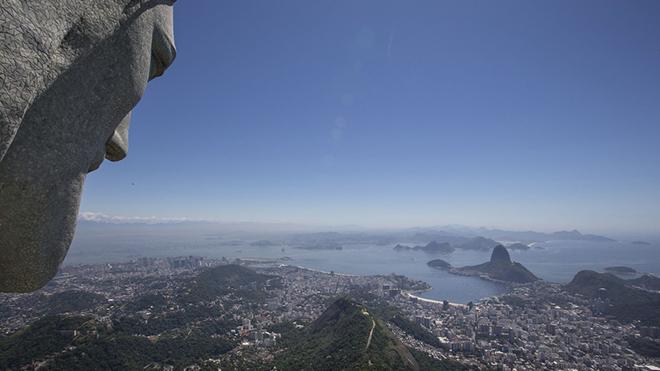If Zika more damaging then Ebola, should Rio 2016 become London 2016?
by Rob Kothe & David Schmidt on 1 Feb 2016

The Christ Redeemer statue, left, overlooks Guanabara bay in Rio de Janeiro, Brazil - Rio 2016 Olympics SW
Right now, it’s 185 days to Rio 2016 and Brazil is reeling under the affects of the Zika virus.
Brazil and other South American countries are experiencing a widespread outbreak of the Zika virus, which is transmitted by mosquito bites (and possibly through bodily fluids, but this has yet to be proven), and from pregnant mothers to their unborn children.
According to the Centre for Disease Control (CDC), Zika is typically spread by the “Aedes” species of mosquito, which is also the vector for the dengue fever and chikungunya viruses.
Of great concern is that apparently only one in five people who contract the Zika virus experience any effects, which can run the gamut from mild symptoms to fevers, rashes, joint pain, or conjunctivitis.
But that hardly matters, its another side affect entirely that is the real danger.
Health officials strongly believe that there is a correlation between the virus and a surge in the number of babies born with microcephaly - a birth defect where children are born with significantly smaller heads and brains than healthy infants. This in turn leads to a raft of other problems for the baby, including early deaths and very significant mental disabilities, seizures, and developmental issues.
World-wide this virus could cause millions of babies to be born with a life damaging disability, perhaps this could a much bigger threat to global health than the Ebola epidemic that killed more than 11,000 people in Africa.
That is the stark claim of several senior health experts ahead of an emergency meeting of the World Health Organisation today Monday in Geneva which will decide whether the Zika threat – which is linked to an alarming rise in cases of foetal deformation called microcephaly – should be rated a global health crisis. If this happens this could have a very major consequences for the Rio Olympic games.
“In many ways the Zika outbreak is worse than the Ebola epidemic of 2014-15,” said Jeremy Farrar, head of the Wellcome Trust. “Most virus carriers are symptomless. It is a silent infection in a group of highly vulnerable individuals – pregnant women – that is associated with a horrible outcome for their babies.¨'
As a result of the Zika outbreak and the possible connection to microcephaly, several Central and South American countries - including Ecuador, El Salvador, Jamaica and Colombia - have asked women to avoid becoming pregnant for the next two years. Repeat TWO years.
Already some airlines - including United - are offering some ticketed passengers (e.g., pregnant women, or women who plan to become pregnant, which of course could be any woman of child bearing age including just about every Olympic female athlete) headed to the affected regions an option to delay their trip or to get a refund.
Whilst there is a strong chance that the Zika virus will spread to other areas of the world where the Aedes mosquito is found (read: all of North and South America, with the exception of Canada, as well as wide swaths of the rest of the planet including much of Southern Europe, Africa and Asia), there is an equally strong chance that travellers and athletes who are attending the Games could inadvertently accelerate this spread by bringing the Zika virus back home to their family, friends and communities.
Then there’s the question of how long one can remain infected and therefore serve as a vector for the virus. This last point is especially worrisome for women of childbearing age, as women can transmit the Zika virus to their unborn babies. Worse still, depending on the duration that a human can serve as a Zika vector, it could take years to know the full extent of the microcephaly risk.
Given the fact that medical authorities are already suggesting the need for a two-year pregnancy deferment, medical authorities asked when would they know if future pregnancies could produce babies with micro-encephaphy or other devastating birth defects say in five years’ time, answered we won't know for five years.
With The Australian Olympic Committee now advising female athletes to consider the health implications, some Australian female athletes already selected for Rio have said they will delay their decision on whether to compete or not until July, because of the fast moving situation.
The standing water in the slums of Rio and the waterways leading into Guanabara Bay are perfect breeding grounds for the transmission via the bite of mosquitoes from the Aedes genus, primarily Aedes aegypti, but others found including the Asian tiger mosquito now also common in Italy, France and Spain.
Given the fact that Brazil's promises on pollution control have not translated into action, it would be a brave of sporting administrators to assume that the mosquito would be controlled by August 2016.
For Rio 2016 the only good news from this potential disaster is that the possibility of getting a gastro intestinal tract infection from the faecal pollution in Guanabara Bay hardly matters when one is weighing the risks of brings a massively damaged child into the world, as a result of Rio 2016 participation.
Then comes the real questions, should the Games actually be held in Rio or should there be an emergency relocation?
If you want to link to this article then please use this URL: www.sail-world.com/141910